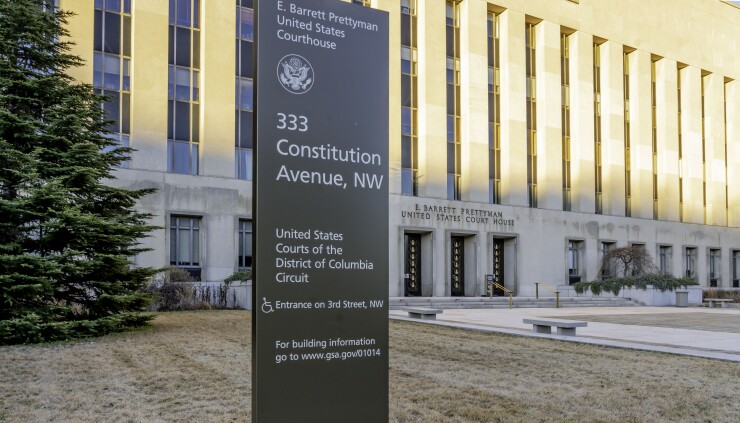The D.C. Circuit Court of Appeals' dismissal of a Securities Industry and Financial Markets Association lawsuit against the Securities and Exchange Commission closes a two-year dispute over regulatory changes and due process.
In an unpublished per curiam judgment filed Feb. 18, the court dismissed as moot SIFMA’s petition for review of a 2020 SEC temporary conditional exemption for municipal advisors. Broker-dealers opposed the TCE because it allowed MAs to perform some work typically requiring broker-dealer registration.
The court did so because the temporary exemption put in place during the height of the COVID-19 pandemic, which SIFMA described as “arbitrary and capricious,” expired as planned, at the end of 2020.
The temporary exemption excused from broker-dealer registration municipal advisors arranging certain transactions between their municipal issuer clients and financial institutions.

The commission had previously floated a proposal to provide a similar exemption, but chose not to move forward with it after soliciting public comment in October 2019.
SIFMA filed suit in August 2020 arguing that by putting the temporary exemption order in place, the SEC had promulgated “purportedly temporary but definitely extendable substantive regulatory change without using notice and comment.”
The court
In dismissing SIFMA’s petition for review, the court found that two exceptions to the normal rules of mootness that SIFMA relied upon did not apply to the SEC’s order.
“In short, the voluntary-cessation exception to mootness does not apply because the SEC set the order’s expiration date before [SIFMA] petitioned for review,” the court wrote.
The court added, “And the capable-of-repetition-yet-evading-review exception does not apply because the order was not “by its very nature short in duration.”
During oral arguments in October, Theodore Weiman, counsel for the SEC, said that SIFMA’s “petition for review should be denied for several reasons, but [that] jurisdictional defects are at the top of that list.”
“The petition 'seeks no effectual relief that this court can provide, the order is no longer in effect, the exemption is no longer impacting anyone, and the result SIFMA seeks here is already the status quo,” Weiman told the court.
On the other hand, Sarah Levine, counsel for SIFMA argued that the association’s petition was not moot because “[the challenged action] is capable of repetition and evading review.”
In support of that assertion, Levine pointed to a legal standard that a case is not moot if ”there is a reasonable expectation that the same complaining party will be subject to the same action and that the challenged action is too short in duration to be fully litigated.”
In response, the SEC
Here, the court’s decision hinged on two points. First, that the expiration date for the temporary conditional exemption had been set by the SEC before SIFMA petitioned the court for review.
Additionally, the court pointed out that the capable-of-repetition-yet evading review doctrine applies to repeatable conduct that “is by its very nature short in duration, so that it could not, or probably would not, be able to be adjudicated while fully live.”
The court said that SIFMA did not offer evidence that “short durations are “typical of” exemptions from registration requirements for broker-dealers.
“[SIFMA] has not pointed to a pattern of short time periods for similar orders. And it has not argued that the statute puts time limits on such orders,” the court wrote.
As a result, the court dismissed SIFMA’s petition for review of the SEC’s temporary exemption for municipal advisors because expiration of the order “provided [SIFMA] with the relief it sought.”
Both SIFMA and the SEC declined to comment. The case is SIFMA v. SEC, No. 20-1306.





